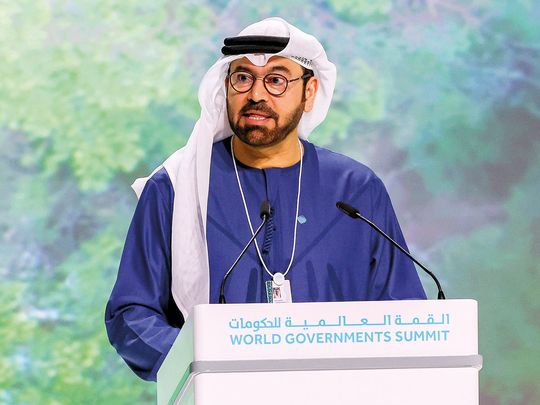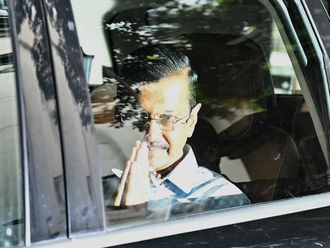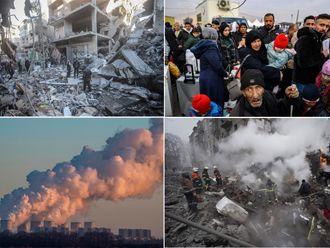
Dubai consistently sets higher standards, driven by a commitment to excellence in public service, which has become the hallmark of the Dubai government’s approach. This ethos of surpassing expectations was vividly on display at the recent World Government Summit, attended by nearly 4,000 distinguished figures ranging from presidents and government leaders to industry executives and experts.
This year’s edition was held under the theme of ‘Shaping Future Governments’ “emphasising the impact of modern technology on societies, including its benefits and potential risks. This theme is particularly thought-provoking, highlighting a forward-looking perspective at a time when many nations are embroiled in historical conflicts that consume vast amounts of human life and resources.
Mohammed Al Gergawi’s opening speech highlighted this point clearly by revealing a staggering statistic: the annual cost of conflicts is $17 trillion, an amount that could address humanity’s most pressing issues, such as poverty, illiteracy, and disease.
The discussions at the summit primarily focused on the transformative impact of artificial intelligence (AI) on humanity and development, signalling the advent of a fourth scientific revolution and a new era for human civilisation. This revolution is powered by AI technologies capable of diagnosing a multitude of diseases, including incurable ones, from a single blood sample.
The rise of AI
AI’s capabilities extend to condensing a fifty-page document into a concise summary within just five seconds, proposing alternative energy solutions, and demonstrating a capacity that has expanded a thousandfold in just the past year. Its sophistication and complexity are on the rise, offering solutions across various sectors, including public administration (government), economic institution management, private sector, and societal security.
However, this technological development also has downsides, particularly as it can intensify the brutality of wars and enhance the pursuit of adversaries. One of the critical concerns is its role in “hijacking public opinion.” The proliferation of fake news is alarming, with the number of fake video broadcasts doubling last year to reach half a million. This surge in misinformation has made swaying public opinion much easier and more impactful than ever in human history.
AI has reached a level of sophistication where it can convincingly replicate an individual’s voice and image, fabricating scenarios involving people they have never met. This capability is growing at an unprecedented rate, outpacing both natural immunity and the spread of information, which raises significant concerns about trust in governments and the financial stability of companies.
As one speaker aptly noted, AI, much like a car, can facilitate our journey to desired destinations, but in the wrong hands, it has the potential to cause harm.
At the summit, there was a palpable sense of apprehension regarding the future, underscored by the World Health Organisation’s Secretary-General’s statement. He warned of an inevitable global pandemic, emphasising the necessity for the world to learn from the initial outbreak — a lesson it appears yet to have fully gravitated.
Zero bureaucracy
This has led to discussions about the delicate balance between technological advancement and bureaucracy. The challenge lies in finding the right level of control for AI use: too strict, and we stifle the benefits of AI; too lax, and we risk widespread abuse affecting individuals, states, and financial institutions alike.
This dilemma extends to what one expert termed the “technological divide,” referring to the gap between societies that can effectively utilise technology and those that cannot, for various reasons.
The disparity in technological adoption and innovation is evident in the statistics, with China registering 29,000 patents in AI in just one year and India producing the largest number of graduates in science, technology, engineering, and mathematics, positioning the East as a formidable challenger to the Western system. These developments suggest a shift in the global balance of technological prowess towards the East in the coming decades.
To mitigate the challenges stemming from the ongoing competition between governments in balancing technology and organisation, it was proposed to adopt management technology as a perfect solution, in addition to moving towards “zero bureaucracy,” as advocated by His Highness Sheikh Mohammed bin Rashid Al Maktoum, Vice President, Prime Minister, and Ruler of Dubai, in a previous meeting.
However, this transition necessitates not only well-trained minds but also the establishment of a value matrix founded on trust and transparency, treating state achievements as a form of national service.
Among the distinguished speakers at the summit was the President of the Kyrgyz Republic, who openly shared his country’s political and economic experience. He described Kyrgyzstan as a nation rich in natural resources and marked by its mountainous terrain, which has experienced multiple military coups. The country’s governance model has oscillated between a parliamentary republic and a centralised authority.
He shared the lesson learnt that a dual-headed state is ineffective and impedes progress. Initially, the existence of both a prime minister and a president led to policy conflicts. The resolution came with the decision to vest all governing authority in the President, thus eliminating these conflicts through the adoption of “vertical power.”
The foremost challenge encountered was combating corruption, as Kyrgyzstan possessed wealth but lacked proper administration. To address this, a delegation was sent to Dubai to glean insights from its exemplary management practices.
Reflecting on Rwanda’s severe civil war history, its president said that “societies do not learn from history,” highlighting the persistent issue of civil unrest and its destructive effects on state stability.
This summary captures the essence of the global summit’s dialogue, underscoring the need for an executive summary that concisely presents the main ideas discussed for public benefit. In essence, Dubai stands as a testament to visionary thinking, embodying an idea that transcends its physical form as a city.
Mohammad Alrumaihi is an author and Professor of Political Sociology at Kuwait University




_resources1_16a45059ca3_small.jpg)







